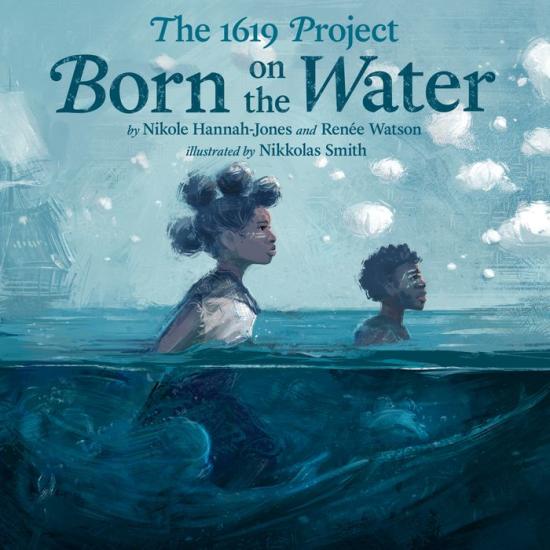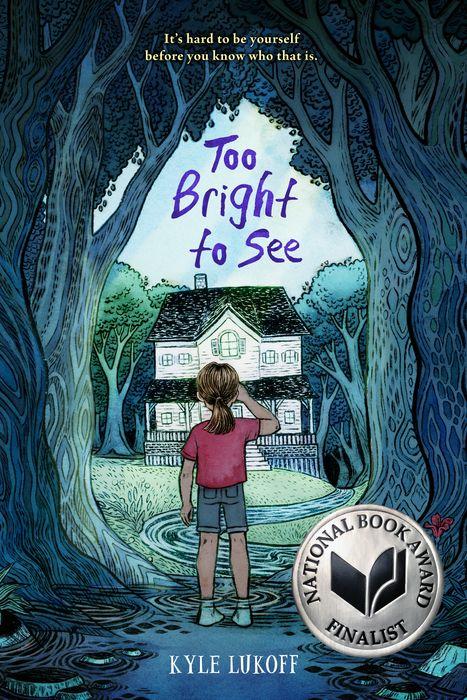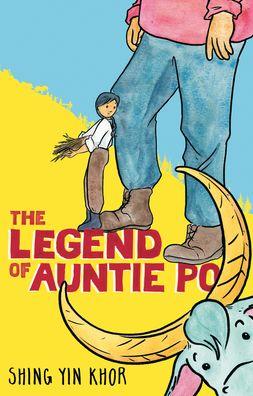The 1619 Project: Born on the Water by Nicole Hannah-Jones and Renee Watson, illustrated by Nikkolas Smith. Kokila (Penguin Random House), 2021, 37 pages.

“My teacher gives us an assignment. ‘Who are you?’ she asks. ‘Trace your roots. Draw a flag that represents your ancestral land.” In real life, most elementary kids wouldn’t have a clue (my ancestral land would be hard to pin down—mixed European, but I wouldn’t be surprised if there’s some Native or African blood in there). But all around our nameless protagonist, classmates are busily drawing and flags and family trees. So she asks her grandma, who gathers the family. “Let me tell you where we’re from.” This is the Kingdom of Ndongo on the west coast (now Angola), where a healthy, creative culture thrived until “the white people took them anyway.” Crowded ships, cruel whips, grieving and death followed. But out of death, a new birth. “And that is why the people say, ‘We were born on the water, we come from the people who refused to die.’” They made the New World their home—resisted, restarted, resettled, and created a new culture from the best of Africa and the best of America.
The girl who hears this story returns to school the next day and draws her ancestral flag: the stars and stripes.
The “1619 Project,” originally published by the New York Times in 2019, has been justly criticized as faulty history. It leans heavily on the idea that America wouldn’t be America without the unwilling enslaved Africans who built this country. Other cultures built this country as well, and the ideals of self-government and individual liberty didn’t come from Africa. The downsides of Black culture don’t figure in this narrative either, but overall it’s a hopeful message: that African-Americans belong here as much as anyone, and they brought valuable contributions to our nation. The exuberant illustrations reinforce the text.
What are its chances? Pretty good, I’d say. I would give Born on the Water a 50-50 chance of ending up on the slate of Newbery honors, and it’s a shoo-in for a Coretta Scott King award.
Starfish by Lisa Fipps. Nancy Paulsen Books (PRH), 2021, 256 pages.

Eliana (Ellie) made a big mistake before she was old enough to comprehend Fat Girl Rules. For her fifth birthday party, she invited all her friends to the family’s backyard pool and—mistake one—wore a whale-themed swimsuit. Then—mistake two—started the festivities by staging the splashiest cannonball ever. From then on, “Splash” is her most recognizable nickname, followed by a close second: “Whale.” “Fat Girl Rule/ I learned/ at five:/ No splashing./ No cannonballs./ No making waves.// You don’t deserve/ to be seen or heard/ to take up room/ to be noticed.// Make yourself small.” And if she doesn’t like that, the answer is simple: Lose weight. That’s what her mother is always on about, alternating with You’d be so pretty if. Her mother is obsessed with the subject, her older sister indifferent, her older brother mean, her classmates sadistic. Sympathy comes only from her dad (a psychiatrist), her bestie (who just moved away) and her new bestie (who just moved next door, along with her boisterous, accepting Hispanic family). Ellie’s breakthrough comes when her dad takes her to a therapist who, by patiently listening and guiding, is able to get past the girl’s anger and hurt and to a form of self-acceptance.
The insults and pranks Ellie endures seem extreme, but the author assures us in her Author Note that she herself suffered every one of those ugly comments when she was growing up fat. The “just be yourself” message can be confusing for middle-grade kids who don’t know who they are yet, but readers can certainly feel Ellie’s triumph when she gets to that point. (And they’ll want to shake her clueless mother several times before then.) That said, I have mixed feelings about the body positivity expressed in her story. Some people are naturally heavy and it’s good that we’re getting past a “skinny is beautiful” cultural mindset. But obesity is another matter, unhealthy in itself, not to mention its unhealthy obsession with food. Starfish is a good novel: well-written, sympathetic, and engaging. I’d recommend it to any middle-grader as a way of understanding and sympathizing. As a way of self-acceptance . . . very carefully.
What are its chances? Better than 50/50, I’d say. This is the author’s debut novel and one of the first to catch the body positivity wave. And it’s good novel, as all Newbery winners should be.
Too Bright to See by Kyle Lukoff. Dial (PRH), 2021, 186 pages.

Bug, age 11, is grieving the loss of her Uncle Roderick, who has been a father figure to her ever since her own father died. “Father figure” might not be quite accurate though; Uncle R is not only gay; he’s also a drag queen with a closet full of sparkly clothes and headdresses. Since his cancer diagnosis he’s quit the drag scene and has lived quietly with Bug and her mother in the centuries-old house in small-town Vermont. The house is haunted, a fact the whole family accepts. But with her uncle’s passing, one particular ghostly presence seems determined to break through to Bug from the afterlife. A series of vivid dreams leads her to realize it’s Uncle Roderick, and he’s trying to tell her something. Is it about himself, or about her? Or . . . both?
The atmosphere of gloom that surrounds the opening chapters doesn’t quite lift. “Bug,” whose given name we never learn, spends most of the novel feeling alienated from others and herself, grieving, and sometimes frightened. Only after her uncle appears in the final dream and cuts her hair does she understand that she’s actually a boy. Her mother and her best friend accept this revelation with no hesitation, and Bug faces a confident future—with no concerns about top surgery, never-ending hormones, possible sterilization, or second thoughts later. Though better written, the story’s trajectory resembles that of George (now officially retitled Melissa), a happy conversion tale. “Be who you really are” is the theme, but the middle-grade readers this book targets don’t have a clue who they are, really or otherwise. Middle-grade is a time of trying on identities, but this is an identity with permanent consequences.
What are its chances? I’ll go out on a limb and say slim. Too Bright to See has appeared on almost every “best of” list there is, but for the Newbery committee it seems a bridge too far, and too agenda-driven.
The Legend of Auntie Po by Shing Yin Khor. Kokila (PRH), 2021, 283 pages.

In the 1885 Sierra Nevada logging camp run by Nels Anderson, his Chinese kitchen manager Hao is the best cook within 100 miles. Hao’s daughter Mei makes the best pies, and together they keep the loggers well fed. Hao has brought family traditions from China but Mei doesn’t relate much to them. She doesn’t pray to ancestors (or anyone else) and entertains the camp children in the evenings with stories she’s made up for herself. They love her stories about Auntie Po, a grandmother taller than a white pine, who could out-log Paul Bunyan with the help of her blue water Buffalo Pei Pei. Mei is untraditional in other ways, particularly in her feelings for Mr. Anderson’s daughter Beatrice (Bee). Both girls are 13, too young to get romantically involved, and Bee plans on a traditional marriage anyway.
Not too much happens in this graphic novel, but readers learn something about logging tools of the late 19th century with the excellent drawings that decorate each chapter heading. The author’s afterward goes on about indigenous peoples and whiteness and marginalization and “who gets to own a myth,” but things actually work out pretty well for Mei, and the white foreman Mr. Anderson is generally fair. At the beginning we read that “This is a story about stories,” but I didn’t sense a strong focus on what any of the stories were about.
What are it chances? Auntie Po has appeared on just about every “best of” list there is. Since, as I mentioned, the wokish themes are soft-pedaled, it probably has a better-than-average change of appearing somewhere on the Newbery slate.
Stay tuned: Tomorrow, we’ll begin our first round of Newbery Buzz talks with a discussion of a strong contender, The Beatryce Prophecy!
Support our writers and help keep Redeemed Reader ad-free by joining the Redeemed Reader Fellowship.
Stay Up to Date!
Get the information you need to make wise choices about books for your children and teens.
Our weekly newsletter includes our latest reviews, related links from around the web, a featured book list, book trivia, and more. We never sell your information. You may unsubscribe at any time.
We'd love to hear from you!
Our comments are now limited to our members (both Silver and Golden Key). Members, you just need to log in with your normal log-in credentials!
Not a member yet? You can join the Silver Key ($2.99/month) for a free 2-week trial. Cancel at any time. Find out more about membership here.
2 Comments
Leave a Comment
You must be logged in to post a comment.


I loved this informative post and have read two of the books you discussed, (Starfish and Too Bright to See). Both books were well-written, But I felt that Too Bright to See in particular was a bit unnerving. I understand about the quest for identity and the confusion of feeling alienated, but some of the things “Uncle”A ROderick does was very unsettling to me. If I’d woken up and found my hair cut, I think that would be traumatizing. I almost felt like BUg was being forced into changing identities by his uncle. Also, I found the acceptance of his lifestyle change to be too easy. A better book about this theme is Frankie & BUg, by Gayle Forman, although it still has some of the usual problems regarding this type of literature.
I loved Starfish as I’ve struggled with weight issues all my life. Yes, Ellie’s treatment by others seems extreme, but it sadly happens. I was so angry with her mother and brother and never felt that their relationships were adequately resolved. It’s been a book I haven’t been able to forget, though, and I could see it being a Newbery honor winner.
THe book I wish would win is Just Like THat, by Gary D Schmidt.
I really struggle with these “Best Of” lists, and my ambivalence twards them is growing every year. It sounds awful for me to say these things, I’m sure, but I just feel that some titles are chosen because of the themes they address and not because of literary quality. I must stress that I haven’t read all the books, though.
Another book I wish would win is A Place to Hang the Moon, by Kate Alvus.
Great insight, Meredith! We struggle with these best of lists, too. We’ll add our votes for Just Like That and A Place to Hang the Moon, though! Those are team favorites around here (for those who haven’t read those, you can read our starred reviews of Just Like That and A Place to Hang the Moon).